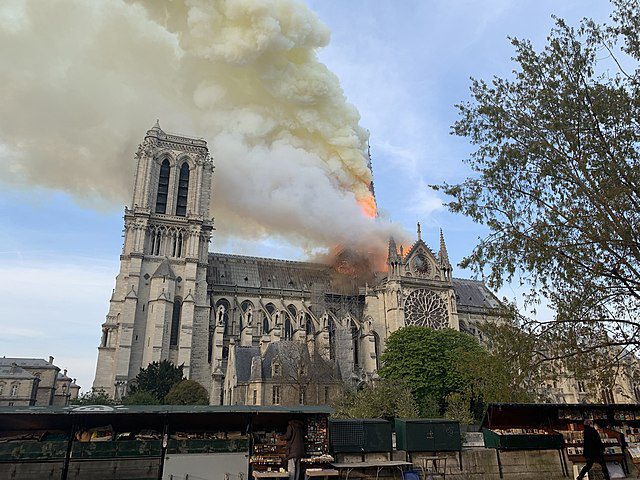The Latest on the Notre Dame Fire, Against the Political Invasion of Art, and in Defense of the Thesaurus

You’ve read the news and seen the images and video. Notre Dame has been ravaged by a fire. “The Paris Fire Service announced on Twitter that firefighters ‘came to grips with’ the blaze at 3:30 a.m. Tuesday, more than 12 hours after nearly 400 firefighters had battled the inferno that altered the city’s skyline. Two policemen and one firefighter had been slightly injured, according to the fire service.” The exact cause of the fire is unknown, but authorities are treating it as an accident. Some writers see in the destruction of the Parisian cathedral a symbol of a charred Christianity in the West, which has been gutted by scandal and heresy. Perhaps, but that seems a little too facile to me. Let’s just write about what we know, and that is: a great monument has been lost. Even if it is rebuilt, which I hope it is, it will never be the same.
Here are some photos of the cathedral before and during the fire. Here are photos of the damage inside after the fire was put out. Slate has a helpful (though incomplete) list of what has been lost and what has been saved.
I’m tempted to stop this email here, but life and culture move on, however unexpectedly. And so, in Aeon, Benjamin Harnett writes about the codex and the fact that nearly every ancient Christian text is not written on a scroll but on bound sheets. The technology itself is not Christian, he writes, but Christians were early adopters for practical reasons: “Ease of reference, capacity and portability would have recommended the codex for Christians, just as these factors recommended it to Martial.”
Speaking of books, one that gets a lot of hate, especially from us English professors, is the thesaurus. After all, we suffer first-hand from students’ mindless employment of it to inject lifeless prose with a bit of gaseous inflation. But the book has its uses, B. D. McClay argues, and we shouldn’t throw out the enfant with the eau du bain: “If a thesaurus can be a trap for the unwary, who don’t realize the next step after browsing a collection of words is to go look those words up in a dictionary, this seems like a problem with a one-time solution.”
In praise of Miró: “The tension in Miró’s life between obedience and rebelliousness—between order and anarchy, precision and looseness, control and disinhibition—is pervasive in his art, and this creative tension is on display in ‘Joan Miró: Birth of the World,’ a superb exhibition at the Museum of Modern Art in New York centered upon the connections between Miró’s art and poetry.”
Essay of the Day:
We are obsessed with politics, Chris Beha writes in Harper’s, and this obsession invades everything, including art. It shouldn’t:
“Whatever forces have built up politics as an ever-present collective obsession, whatever forces have taught us that quiet contemplation is not just useless but actually irresponsible, there are now too many people profiting from the idea for it to fade away in the natural course of things. The political-entertainment machine is never going to give us our lives back. It will never announce an end to hostilities, tell us it is safe to return to our homes. To quote Lewis: ‘Life has never been normal.’ If we are going to restore the balance, we are going to have to do it during ‘war-time.’ If the goal of turning some of our attention away from politics is worth working for on January 20, 2021, it is worth working for now.
“To what do I propose we dedicate our attention instead? Well, all sorts of things, but above all what Lewis called ‘intellectual and aesthetic activity.’ The critic Wesley Morris wrote a much-discussed New York Times Magazine essay published in October about art as ‘a battleground for social justice.’ ‘Everything means too much now,’ he contended. But my own feeling is the opposite—everything other than politics means too little.
“These days we divide our cultural consumption into two categories. There is escapist entertainment, the value of which lies precisely in its ultimate insignificance, serving as a kind of release valve for the pressure of our day-to-day lives. Then there are cultural objects that matter because they advance a political argument. When people complain about the politicization of culture, what they mostly mean is that things that had once stood comfortably in category one—late-night TV, football, the Oscars—are increasingly migrating to category two. People seem to have entirely forgotten a third category: culture that matters for its own sake, culture that enacts ‘the search for knowledge and beauty.’
“Knowledge and beauty; pleasure and delight; the contemplation of truth, irrespective of its instrumental uses; the intimate encounter with another human consciousness offered by the best works of art—these are among the things that make life worth living. If we set them aside until we have made it safely through our present emergency, we will never return to them, because our present emergency will never be through.”
Photo: What has been lost
Receive Prufrock in your inbox every weekday morning. Subscribe here.